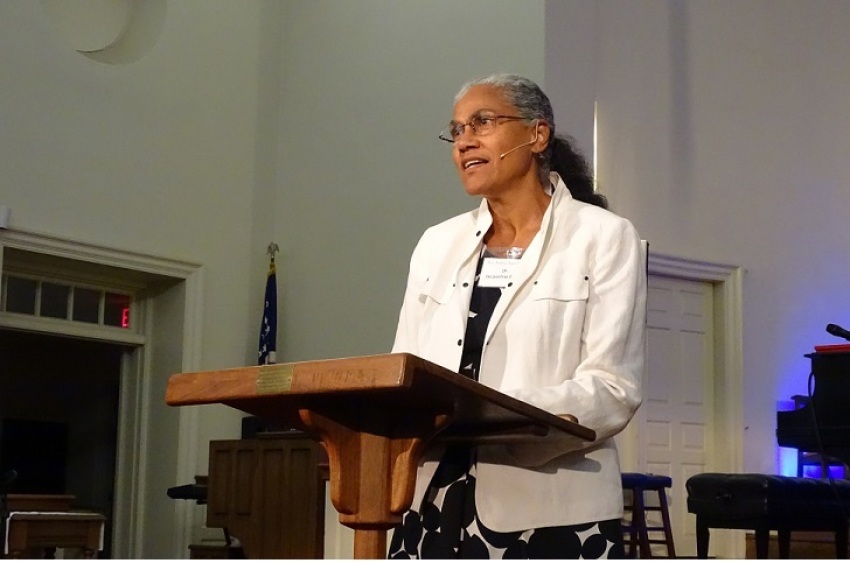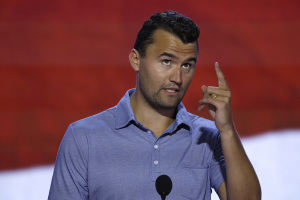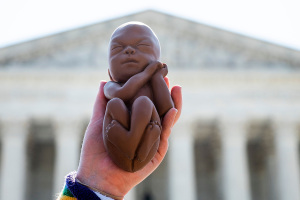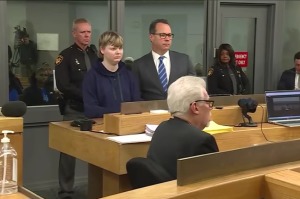How to address America's '400-year experiment on the black family': scholar

FAIRFAX, Va. — The United States has conducted a 400-year experiment on the black family and it's incumbent upon Christians to respond to the ongoing crisis, according to a Christian sociologist from Harvard University.
In a lecture titled "America: A four-hundred year experiment on the black family" held in the sanctuary at Truro Anglican Church on Sept. 21, Jacqueline Rivers, a sociologist at Harvard University, exhorted the hundreds in attendance from dozens of local churches to engage the social crises that have afflicted black Americans with all of the available tools, scientific data and the eternal truths of God's Word.
Rivers' lecture was given in commemoration of both the launch of the Truro Institute and the 400th anniversary of the slave trade in North America, which began in the Anglican colony of Jamestown.
"We are people of the Spirit. We are Christians. We serve Jesus. And for that reason, the question of the family is all the more important. It's important because marriage really is an illustration of the relationship not only between Yahweh and Israel but also between Jesus and the Church," Rivers said.
"In these days when marriage is under so much fire from so many different directions, it's important for us in the church to engage," she said, "because if the Holy Spirit is going to use us to address the problem, we need to be well-equipped and understand what the problem is."
Offering a distinctly sociological analysis, the Harvard lecturer noted that the problems experienced in the black family are not unique to the black family. But as a class of people, African Americans have experienced specific cultural and structural abuses and injustices that no other group in the United States has, she stressed.
Between 1970 and 2010 there was a significant decline in married black women between the ages of 40 and 44, she said. In 1970 the figure was 61 percent; by 2010 it had dropped to 37 percent. While not married, many of those women are still having babies, leading to a rise in out-of-wedlock birthrates.
When the late Democratic Senator Daniel Moynihan issued his report, The Negro Family: The Case for National Action, for which he was widely pilloried, she noted, only 25 percent of black children were born outside of wedlock. By 2005, the figure had risen to approximately 70 percent, a statistic that has remained steady ever since. The latest figures Rivers could find showed that the number had decreased slightly, to 69 percent. This phenomenon has contributed to the ongoing breakdown of families, fueling the scourge of children being raised without both parents, and widening the gap between the races.
"The problem is that this is not just about conforming to some sort of old-fashioned values or to some white cultural stereotypes, or even what the Gospel says. They are actually, in addition to the spiritual ramifications, real tangible effects in the lives of black people, black families because of this retreat from marriage," Rivers said.
Such a retreat from marriage has, in part, yielded increased poverty rates across the board but especially among blacks. And the earnings gap between married blacks and single black women is not closed when things like the earned income tax credit is taken into consideration. The breakdown in marriage in the black community pre-dates recent decades, Rivers elaborated. Enslaved black people were not allowed to be legally married; their purportedly Christian slaveholders forbade them from doing what the Bible commanded as it pertains to marriage.
By forbidding marriage, the man's role as husband and father was severely undermined as he was not in a position where he could provide and support his family and neither parent could protect and safeguard their children. Nor could men protect their wives from the slaveholders who would rape them, she explained.
"And this was in an age when men had the unchallenged role of protector and provider. What made this worse was that in slave marriages, the couple would not even live on the same plantation," Rivers said.
The picture of what life was like from that era which exists in the imaginations of many Americans comes from movies such as "Gone with the Wind" where thousands of slaves dwelled on a large plantation. But the truth is that most enslaved persons lived on small holdings.
Very often there wouldn't be anyone for a woman to marry. Enslaved Africans did not want to marry a blood relative, so that then further limited the people the women had to choose from. Very often, slave marriages were between men and women on different plantations and husbands were called "broad" husbands. They required a pass from their slaveholder in order to visit their wives, which was allowed only on the whim of their master. At most, they only saw their wives a few times per week, which encouraged infidelity, especially among men.
"And that continues to be a major problem in the black family even now," she said.
Taken together with masters raping the enslaved women, the black family was fundamentally unstable in light of their circumstances. Masters could decide at any point to sell away a child, a mother, a father, intentionally rupturing the familial structure for their own economic benefit. There was an internal slave trade in the United States after the end of the trans-Atlantic slave trade, which meant that, to some extent, slaveholders in the mid-Atlantic states were likely to treat enslaved people like breeders and less likely to respect the common law marriages between enslaved men and women, Rivers added.
Thus, key aspects of marriage, exclusivity and permanence, were deliberately undermined for black people. Yet despite this, deep familial bonds were formed among the enslaved. Immediately after the Emancipation Proclamation, many common law marriages were soon formalized.
Further contributing to the disparities between white and black families were government policies that disproportionately favored whites over blacks decades after slavery ended. FDR's New Deal, for example, brought good-paying employment and economic benefits and relative stability to whites, but given the nature of jobs they had at the time, blacks were denied key benefits such as unemployment insurance and Social Security. Because economic programs were administered locally, southern officials would deny black people the benefits they were entitled to under the law, giving the white middle class a significant advantage. Similar tactics were employed with the G.I. bill, limiting housing, occupational training, education for black men.
"All of this further undermines marriage," Rivers emphasized, "because by the middle of the 20th century you find that black men are earning less than a living wage, and that they're not able to take care of their families, which makes for angry wives, makes for disappointed and bitter children, for men who are plagued with shame and guilt."
As much as the Moynihan report was derided, in part because it contains offensive language, the central argument the senator made was that a material difference between middle class black families and poor black families was that black men did not have the type of jobs they needed to take care of a family. Moynihan was arguing for that kind of employment for such disadvantaged black men, she said.
Ever since, employment opportunities for men, especially black men with limited education, have only worsened. If jobs have not been shipped overseas they have been replaced by automation. As a result, poor black men have become less marriageable.
"[Black] women look at them and say, we have a saying, 'I can do bad all by myself,'" Rivers said.
Yet another scourge that has devastated the black community is mass incarceration, she continued. Between 1980 and 2000, the number of incarcerated persons in the U.S. rose from approximately 300,000 to over 1 million. In the 100 years before 1980, the number of prisoners had only increased by 285,000.
"Something's really broke," she said, referencing data from Pew, "and it has been much, much worse for black men than for white men. And the men who have really suffered, both black and white and Hispanic, are men with less than a high school education."
Blacks comprise 12 percent of the U.S. population yet represent 33 percent of the prison population. And when it comes to drug convictions, they are convicted and receive prison sentences at disproportionate rates compared to whites, deepening the structural issues.
"This is not just about who is doing what. This is about racial injustice in the justice system," she said, citing changes in three strikes laws, mandatory minimum sentencing — where judges no longer had discretion to consider extenuating circumstances — and the way in which the government prosecuted the war on drugs.
Blacks have been much easier targets since much of the drug trade they participated in took place on the streets and were thus more visible, whereas whites have tended to use and trade drugs behind closed doors. Disproportionately heavier sentences were given to users of crack cocaine, mostly blacks, than powder cocaine, mostly whites, she added.
With so many black men incarcerated, they were not available to be married, she said, returning to her main point about the retreat from marriage.
"One-third of all poorly educated black men will be incarcerated over the course of their lives and it changes the trajectory of a man's life," she added.
Rivers urged those in attendance to speak out against mandatory minimum statutes, call for public policy that turns such laws around, and consider alternative sentencing for nonviolent offenders.
"When you incarcerate nonviolent offenders, what we're doing is putting them in the company of people who cause them to move further into crime," Rivers said.
She concluded her remarks on a hopeful note, stressing that though decades of unaddressed structural problems have harmed many blacks, "with the right social policy levers and church-based action, it's possible to begin the long, slow process of shifting marriage patterns in the black community and in the nation."
Rivers is a doctoral fellow in the Multidisciplinary Program in Inequality and Social Policy of the J. F. Kennedy School of Government at Harvard Kennedy School. She's also the executive director of the Seymour Institute on Black Church and Policy Studies, which seeks to create and promote a philosophical, political and theological framework for a pro-poor, pro-life, pro-family movement within the ecumenical black church, both domestically and internationally.



























